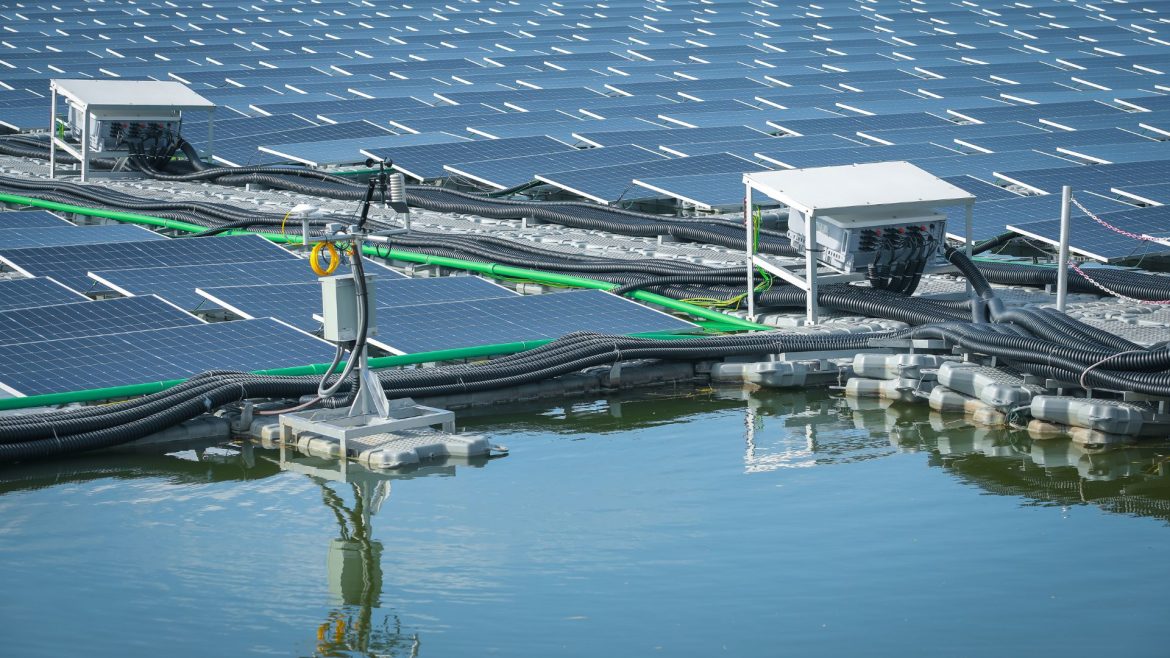Solar panel systems are the most advanced and practical models that unleash the power of sunlight by converting it into electricity. Electricity produced by a solar power plant is clean – it does not cause pollution and reduces electricity bills by at least 90%.
More and more people are moving towards the use of solar power. The popularity of solar systems is seeing an all-time high.
If you’re somebody who wants to go solar but needs to get information about the working, types, and prices of a solar system, you’ve landed on the right page.
This guide has been specially curated to discuss the working of solar for homes and housing societies. Dive in and explore the details of PV systems like never before!
Working of a solar power plant
An on-grid solar system is a careful arrangement of solar panels, solar inverters, mounting structures, AC and DC cables and combiner boxes, lightning arresters, and MC4 connectors.
Off-grid and hybrid systems have all the components of an on-grid system, and in addition to those, they have batteries too. We will explain all these types a little later in this guide.
Let’s focus on the working of a solar power plant first:
- Sunlight hits the surface of solar panels. Solar panels are made up of solar cells that capture and convert sunlight into DC electricity.
- The DC electricity is transferred to the solar inverter, which converts DC power into AC power.
- AC power is then used to run household appliances.
- The extra power is transferred to the grid if the system is on-grid.
- Extra power is used to charge the batteries if the system is off-grid.
- If the system is hybrid, extra power is used to charge the batteries, and what’s left is transferred to the grid.
Types of a solar power plant
As you know already, solar systems are primarily of three types – on-grid, off-grid, and hybrid. Let’s help you explore these types in more detail.
#1. On-grid solar power plant
An on-grid system is a grid-tied system because it is connected to the electricity grid. A bidirectional meter installed in on-grid systems facilitates power exchange between the system and the grid.
Extra power generated by the system is transferred to the grid. At night, electricity from the grid is imported and used to keep the appliances running.
The net meter records the overall unit exchange and is used for generating the solar bill.
If there’s a power cut, the solar panels stop supplying electricity to the house. It’s a safety feature that is also known as anti-islanding. Hence, on-grid systems do not provide electricity during power outages.
#2. Off-grid solar power plant
The name gives it away – this is an independent solar system, not connected to the grid.
Batteries are used to store extra units of electricity that panels produce during the daytime. The stored power is used to run household appliances at night.
#3. Hybrid solar power plant
A hybrid system has both an electricity grid and batteries. As a result, it overcomes the limitation of hindered power supply during power outages. Whenever there’s a power cut, batteries are used to supply electricity to keep the appliances running.
However, this feature makes a hybrid solar system expensive.
Please note: Depending upon the sectors they’re being used for, solar panel systems can also be classified as commercial solar systems, rooftop solar systems for residential use, and ground-mounted solar systems.
Which of the three major types is better?
All three types – grid-tied, off-grid, and hybrid – have their own advantages and limitations. Which of these is better depends on the requirements. Let’s explore the details.
- An on-grid solar power plant is the best choice if the electricity grid is reliable and your place doesn’t see long hours of power cuts. It’s the most cost-effective option out of the three types. When the capacity is selected carefully, it can fulfil all the energy needs of a house.
- If there’s no electricity grid in your area or you require solar energy for agricultural use, an off-grid system is the best option.
- Hindered power supply during power outages might be a concern for some people. In such cases, some people prefer buying batteries for backup. It’s suitable if your area sees frequent power cuts.
Price of a solar power plant
An on-grid system is the best option for residential use. Most homes and housing societies in India install on-grid solar systems.
The ROI is much better; they’re the most affordable of the three types, and the government offers a subsidy to homeowners and housing societies installing on-grid systems.
Naturally, there’s a lot of curiosity regarding the price of solar systems. Solar systems do not have a fixed price but a price range. Prices differ based on the following factors:
- The type of solar panel used
- The capacity being installed
- The type of solar inverter used
- The value-added services selected
Based on many such factors, there’s a price range which we are unveiling for you.
- 1 KW: ₹70,000 to ₹1,10,000
- 2 KW: ₹1,40,000 to ₹1,80,000
- 3 KW: ₹1,80,000 to ₹2,40,000
- 4 KW: ₹2,40,000 to ₹3,20,000
- 5 KW: ₹3,00,000 to ₹4,00,000
- 10 KW: ₹6,00,000 to ₹8,00,000
Conclusion:
Installing a solar system at home offers multiple benefits – electricity bills and pollution are reduced substantially. The government also provides financial help to people installing on-grid rooftop solar systems at homes and housing societies.
If you switch to solar now, you, too, will get the benefits of a subsidy. Sooner or later, every house in India and worldwide will have to switch to solar. So, why wait? Claim the solar subsidy while you still can.


